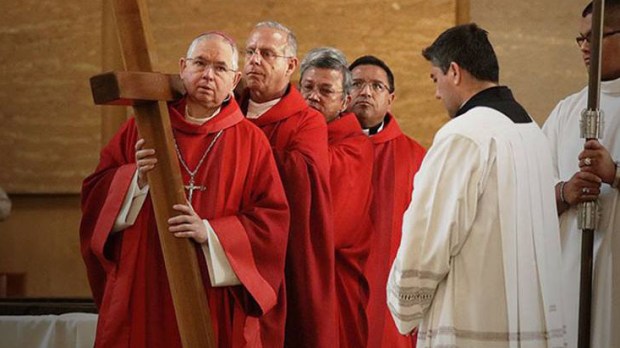The pastors of the Church in the United States have to continue to confront abortion, euthanasia, racism, challenges to the family and religious freedom, and a host of other ongoing issues, but, says the president of the bishops: “I also want to suggest that in this moment, we need to respond to the urgent evangelical challenges posed by this pandemic.”
Los Angeles’ Archbishop Jose Gomez, currently the president of the US episcopal conference, offered that suggestion at the opening of the two-day National Assembly, held virtually.
“Now is the hour for Christian witness,” Archbishop Gomez said. “As we know, people’s faith in God has been shaken. At the heart of their fears are fundamental questions about divine Providence and the goodness of God.
This is far more than a public health emergency. Everywhere, we see spreading the fear of illness and death. As pastors, we understand what this means. It means that the core message of the Gospel — Christ’s love for every person, the power of his cross, the promise of his resurrection — is fading from our neighbors’ hearts. Brothers, in this time of death, we hold the Word of life. We come in the name of the God whose love is stronger than death.
“We need to give people hope,” Archbishop Gomez declared, reminding that “in all things, even in suffering and death, God is working for the good of those who love him.”
Our new Blessed.
Archbishop Gomez noted that recently, “we celebrated a beautiful moment in the history of the American Church — the beatification of Father Michael McGivney, founder of the Knights of Columbus.”
He drew parallels between the challenges faced by Blessed McGivney and what is occurring today:
As you know, Father McGivney was a newly ordained priest in the years just after the Civil War. Blacks had been freed from slavery, but they were far from free. It was a time marked by racist violence, anti-immigrant intolerance, widespread poverty, and growing social problems. Catholics faced discrimination and suspicion from politicians, the media, and cultural leaders.
He was a pastor in a time of moral confusion and social unrest. Just as we are. Like us, he was a priest called to minister in a pandemic. In fact, he gave his life during the flu pandemic of 1890, one of more than 1 million who died worldwide.
Archbishop Gomez said that a “heroic Christianity” is needed for our times too.
I think it is urgent for the Church to bear witness to the transcendent destiny of the human person. As a child of God, redeemed in the blood of his only Son. Called to live as a temple of the Holy Spirit. Brothers, we all understand that these times of social unrest and pandemic call for a heroic Christianity.

Read more:
A Christian’s guide to decisions about death
Perfect storm
The pope’s representative to the United States, Archbishop Christophe Pierre, also reflected on the difficulties of the present time. He spoke of the “dark clouds” hanging over society, pointing out at least four:
One of the largest clouds is the “throwaway culture,” which leads to disregard for human life (in the forms of abortion and euthanasia, human trafficking and new forms of slavery), environmental abuse, and progressive marginalization of groups. Another is the fragmentation and polarization of society, marked by vicious attacks and attempts to spread despair and discouragement to create a situation of permanent confrontation rather than healing. Another cloud is the rapid growth of secularization, in which people live as if God didn’t exist, creating a greater obstacle in transmitting the faith within the family and from one generation to the next and leaving deep wounds in the Church and society. Despite great developments in technology, we are experiencing a loss of an ability to empathize or to show concern for the other as a member of the human family. Although a vital tool in evangelization, technology has not been harnessed to overcome the forces of secularization nor to restore a true sense of connectedness as a family and a Church. The Pope believes that true healing of the world demands recognizing our interconnectedness (cf. General Audience, 12 August 2020). Is this then the perfect storm? Oh, and, I forgot, there is also a global pandemic. So, here we are in the midst of the storm.
The pope’s nuncio referred to the Holy Father’s recent writings to affirm that “if we want to ‘heal the world,’ then we must witness to Christ the Good Samaritan who offers healing, mercy, and compassion to a suffering world.”
He spoke of Pope Francis’ call for social friendship, asking, “Could we as a Church identify how to follow the Holy Father in promoting this social friendship?”
He urged his brother bishops to ask how their response to such issues as migration, racism, and abortion could be more effective.
“What the Holy Father suggests,” he said, “is moving from seeing someone as a neighbor to viewing them as a brother or sister. Thus, he proposes fraternity, not just as a human virtue but as a Christian virtue, which comes from recognizing that we are all brothers and sisters who have God as our Father.”
My brothers, we are journeying together through very difficult times, enduring the coronavirus and a contentious electoral campaign. If we take a step back, we observe that society is in crisis. It is not merely that people are polarized or that the culture no longer supports the Faith; there is a genuine crisis of authority.
“In this context,” Archbishop Pierre said, “we are called to imitate the example of Christ, the Good Samaritan. We are called to submit ourselves to Him and to follow Him, for it is He who exercised authority – not as power but as service.”

Read more:
Pope Francis: Death does not have the last word, life does!

Read more:
Why St. Thérèse wasn’t afraid of death
See the full texts here: Archbishop Gomez and Archbishop Pierre

